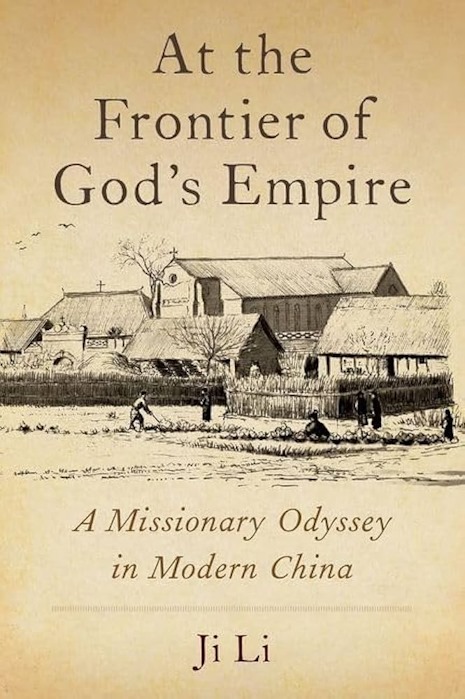| Author | Li Ji 李紀 [Historian], 1976- |
| Place | New York |
| Publisher | Oxford University Press |
| Collection | Ricci Institute Library |
| Language | English |
| Type | Book |
| Shelf | Seminar Room 102-103 |
| Call Number | BV3420.M2 L49 2023 |
| Description | xxi, 245 pages : illustrations, maps ; 25 cm |
| Note | At the frontier of God's empire : a missionary odyssey in modern China / Ji Li. Includes bibliographical references (pages 217-229) and index. Manchuria: migration and Christianity -- Letters and conversations -- The missionary -- The village -- The battlefield -- The church -- The bandits -- Conclusion: the murder and the imperial legacy. "Manchuria, or northeast China, is strategically located at the intersection of four major powers in Northeast Asia: China, Russia, Japan, and Korea. Its inhabitants include Chinese, Russians, Japanese, Koreans, Manchus, Mongolians of various ethnicities, and other indigenous populations. The Manchus conquered China proper in 1644 and founded China's last imperial dynasty, the Qing. In the two hundred years that followed, the Manchu rulers established a multiethnic and multicultural empire. However, as the homeland of the Manchus, Manchuria became emblematic of "the Manchu Way," and from the seventeenth century onward, the Qing government enforced strict but fluctuating policies to prevent the migration of Han Chinese to Manchuria. The restrictions lasted until the mid-nineteenth century, when the Qing began to loosen its prohibition on immigration to Manchuria amid challenges posed by domestic crises and the expansion of Western imperialism. In 1858, Niuzhuang (Newchwang), a small town on the upper reaches of the Liao River in the Liaodong Peninsula, became the first treaty port open to the West on China's northeast frontier following the Treaty of Tianjin, signed after the Second Opium War. A few years later, in 1864, a British customs office was established there. The British chose this small river town in southern Manchuria to open up the market of northeast China and spearhead its strategic interests in the region, particularly in response to the regional imperial competition between Russia and Japan. But before the Anglo-Japanese Alliance of 1902, British policy in Manchuria was weak and indecisive"-- Provided by publisher. |
| ISBN | 9780197656051 ; 0197656056 |
| LCCN | 2022041716 |
| Multimedia |  |
| Author | Li Ji 李紀 [Historian], 1976- |
| Place | Seattle |
| Publisher | University of Washington Press |
| Collection | Ricci Institute Library |
| Language | English |
| Type | Book, Digital Book |
| Series | Modern language initiative books |
| Shelf | Digital Archives, Seminar Room 102-103 |
| Call Number | BV3420.M2 L5 2015 |
| Description | xii, 218 p.: ill., maps ; 24 cm. + pdf |
| Note | God's little daughters : Catholic women in nineteenth-century Manchuria / Ji Li. Preface : Discovering the Du letters -- Acknowledgments -- Christianity, gender, and literacy in Northeast China -- Religion, women, and writing in rural China -- Religious knowledge and behavior -- Establishing faith in local society -- Institutionalization and indigenization -- Faith, gender, and a new female literacy in modern China -- Epilogue : Meeting the Du descendants -- Appendix : MEP missionaries and indigenous priests. Local access dig.pdf. [Li Ji-God's little daughters.pdf] |
| ISBN | 9780295994727 ; 029599472X |
| LCCN | 2015002181 |
| Multimedia |  |